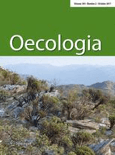
OECOLOGIA
Scope & Guideline
Unraveling the Mysteries of Life Through Interdisciplinary Science
Introduction
Aims and Scopes
- Biodiversity and Ecosystem Dynamics:
The journal explores various aspects of biodiversity, including species interactions, community structure, and ecosystem functioning, often in the context of environmental change. - Ecological Responses to Environmental Stressors:
Research addressing how organisms and ecosystems respond to stressors such as climate change, pollution, and habitat modification is a core focus, highlighting resilience and adaptation mechanisms. - Trophic Interactions and Food Web Dynamics:
Studies investigating predator-prey relationships, food web structures, and trophic cascades are prevalent, providing insights into ecological balance and species interactions. - Conservation and Management Implications:
Research with implications for conservation strategies and ecosystem management is emphasized, particularly in the face of anthropogenic pressures. - Methodological Innovations in Ecology:
The journal encourages the development and application of novel methodologies in ecological research, including experimental approaches, modeling, and technological advancements.
Trending and Emerging
- Climate Change Impact Studies:
An increasing number of papers are investigating the effects of climate change on species distributions, community dynamics, and ecosystem services, reflecting the urgency of understanding these impacts. - Microbial Ecology and Interactions:
Research focusing on microbial communities and their interactions with plants and animals is gaining traction, emphasizing the role of microorganisms in ecosystem functioning. - Invasive Species and Their Ecological Effects:
There is a growing body of work examining the impacts of invasive species on native ecosystems, including their interactions with local fauna and flora. - Functional Trait-Based Ecology:
Studies that utilize functional traits to understand species interactions, community assembly, and ecosystem processes are trending, providing deeper insights into ecological resilience. - Integrative Approaches Combining Ecology and Evolution:
Research integrating ecological and evolutionary perspectives is emerging, highlighting the importance of evolutionary processes in shaping ecological outcomes.
Declining or Waning
- Traditional Species Distribution Models:
There is a noticeable decline in studies solely relying on traditional species distribution models without considering more complex ecological interactions or climate change impacts. - Single-Trophic Level Studies:
Research focusing exclusively on single-trophic level interactions, such as plant or herbivore studies without considering broader community dynamics, is becoming less common. - Static Ecological Assessments:
There is a waning interest in static assessments of ecological data that do not incorporate temporal dynamics or the effects of disturbances over time.
Similar Journals

ECOLOGICAL RESEARCH
Connecting researchers to shape the future of ecological science.ECOLOGICAL RESEARCH is a prestigious academic journal published by WILEY, dedicated to advancing the field of ecology and its associated disciplines. Since its inception in 1986, the journal has consistently provided a platform for high-quality, peer-reviewed research, contributing significantly to the understanding of ecological systems and their complexities. With an impressive 2023 impact factor reflected in its Q1 ranking in the category of Ecology, Evolution, Behavior, and Systematics, it stands among the top journals in its field, as evidenced by its Scopus rank of #192 out of 721 and placement in the 73rd percentile. While accessible through standard subscription models, this journal plays an essential role in disseminating crucial findings and innovative methodologies to researchers, professionals, and students alike. With a commitment to fostering ecological knowledge and collaboration, ECOLOGICAL RESEARCH continues to influence ecological practices and policies, shaping the future of research in this critical area.
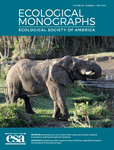
ECOLOGICAL MONOGRAPHS
Advancing ecological understanding through rigorous research.ECOLOGICAL MONOGRAPHS, published by WILEY, stands as a premier journal in the field of ecology, evolution, behavior, and systematics, with an impressive impact factor and ranking in the 96th percentile among its peers. Since its inception in 1974, this journal has offered comprehensive insights and advanced knowledge on ecological phenomena, serving as a vital resource for researchers, professionals, and students alike. With its commitment to publishing high-quality, peer-reviewed articles, it operates within the esteemed Q1 category of ecology, solidifying its reputation as a leading platform for innovative research. Though not available as open access, ECOLOGICAL MONOGRAPHS ensures broad reach and visibility through its rigorous editorial standards and substantial scholarly contributions. As it continues to aggregate vital ecological data and synthesize research across multiple converged years, this journal remains invaluable for those dedicated to understanding complex ecological interactions and their implications for environmental policy and management.
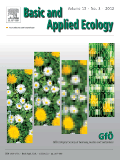
BASIC AND APPLIED ECOLOGY
Fostering groundbreaking research in the heart of ecology.BASIC AND APPLIED ECOLOGY, published by Elsevier GmbH in Germany, stands out as a premier journal in the field of ecology, evolution, behavior, and systematics. With its ISSN 1439-1791 and E-ISSN 1618-0089, the journal enjoys a distinguished reputation, evidenced by its classification in the Q1 category for Ecology in 2023 and impressively ranking #89 out of 721 in this domain according to Scopus. Since its inception in 2000, it has served as a vital platform for disseminating high-quality research that bridges theoretical insights and practical applications in ecology. Researchers, professionals, and students alike can look forward to the latest findings that not only foster a deeper understanding of ecological processes but also inform sustainable practices crucial for our environment. As the journal continues its journey through to 2024, it remains committed to advancing ecological knowledge and supporting innovative research in an ever-evolving field.
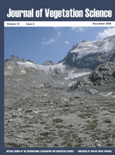
JOURNAL OF VEGETATION SCIENCE
Illuminating the pathways of vegetation dynamics.JOURNAL OF VEGETATION SCIENCE, published by Wiley, stands as a premier platform for disseminating high-quality research within the fields of ecology and plant science. With an impressive rank of #80 out of 516 in Plant Science and #81 out of 461 in Ecology according to Scopus, this esteemed journal is recognized for its significant contributions to advancing knowledge and understanding of vegetation dynamics and biodiversity. Since its inception in 1990, JOURNAL OF VEGETATION SCIENCE has been committed to providing a forum for researchers, professionals, and students to share their findings and engage in critical discussions about the ecological implications of vegetation studies. While this journal does not currently offer open access, it maintains a reputable impact factor, illustrating its importance in contemporary ecological and botanical research. With its Q1 categorization in both Ecology and Plant Science for 2023, it continues to shape and influence the discourse in these disciplines through rigorous peer-reviewed articles, reviews, and synthesis papers.
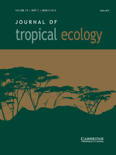
JOURNAL OF TROPICAL ECOLOGY
Exploring the Rich Tapestry of Tropical EcosystemsThe JOURNAL OF TROPICAL ECOLOGY, published by Cambridge University Press, serves as a pivotal platform for advancing knowledge in the field of ecology, particularly within tropical environments. With an ISSN of 0266-4674 and an E-ISSN of 1469-7831, this esteemed journal has been a key resource since its inception in 1985, maintaining a focus on empirical research that addresses the complexities of tropical ecosystems. It holds a respectable Q3 ranking in the Ecology, Evolution, Behavior and Systematics category as of 2023, indicating its significant contribution to the field, although it remains within the competitive mid-range. The journal publishes original research, reviews, and methodological articles that illuminate the rich biodiversity and unique ecological processes of tropical regions, fostering a deeper understanding of conservation challenges. Accessible from the United Kingdom, this publication appeals to a diverse audience of researchers, professionals, and students keen on exploring ecological dynamics in tropical settings, and plays a crucial role in promoting scientific discourse and collaborative efforts aimed at preserving our planet's vital ecosystems.

Food Webs
Exploring the intricate connections of ecological dynamics.Food Webs is a peer-reviewed journal published by Elsevier, dedicated to advancing the understanding of ecological dynamics through the study of food webs. With an ISSN of 2352-2496, this journal provides a platform for novel research that bridges the fields of ecology, evolution, behavior, and systematics. The journal's impact in the academic community is reflected in its 2023 Q2 ranking in both Ecology and Ecology, Evolution, Behavior and Systematics, showcasing its relevance and influence across these interconnected fields. Although it does not offer open access, it remains accessible to a wide audience of researchers and professionals due to its affiliation with a reputable publisher. The Scopus rankings position Food Webs favorably, with significant placements in the ecologically relevant categories, thus highlighting its contribution to advancing our understanding of complex ecological relationships. With a commitment to evidence-based research and interdisciplinary collaboration, Food Webs aims to foster knowledge that informs both scientific understanding and practical conservation efforts.
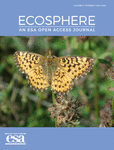
Ecosphere
Connecting researchers to drive ecological discovery.Ecosphere is a leading open-access journal published by WILEY, dedicated to advancing research in the fields of ecology, evolution, behavior, and systematics. Established in 2010 and headquartered in the United States, this innovative journal provides a platform for the exchange of cutting-edge scientific knowledge and discovery, fulfilling its mission to enhance our understanding of ecological systems and their interactions. With a prestigious impact factor reflecting its commitment to high-quality research, Ecosphere is ranked Q1 in both Ecology and Ecology, Evolution, Behavior, and Systematics for 2023, further solidifying its prominence in the scientific community. The journal's scope includes a wide array of topics related to environmental science, making it an essential resource for researchers, professionals, and students aiming to stay at the forefront of ecological research. It offers comprehensive open access options, ensuring that groundbreaking findings are readily available to a global audience, thus fostering collaboration and innovation in the field.

ECOLOGY LETTERS
Connecting research to the pulse of the ecosystem.ECOLOGY LETTERS, published by Wiley, is a premier journal dedicated to advancing the field of ecology and related disciplines. Renowned for its rigorous peer-review process and impactful research contributions, the journal boasts an impressive Scopus Rank of #13 out of 721 in the category of Agricultural and Biological Sciences, positioning it in the 98th percentile globally. With a Q1 rating in the 2023 quartile rankings for Ecology, Evolution, Behavior and Systematics, it serves as an essential platform for ecologists and evolutionary biologists to disseminate cutting-edge research findings from 1998 to 2024. Although not an open-access journal, ECOLOGY LETTERS actively contributes to the global ecology discourse, making it a critical resource for researchers, professionals, and students dedicated to understanding complex ecological interactions and evolutionary processes.

ECOGRAPHY
Transforming Ecological Knowledge into ActionECOGRAPHY, published by WILEY, stands at the forefront of ecological and evolutionary research, with an impressive Impact Factor reflecting its esteemed position in the Q1 category of Ecology, Evolution, Behavior, and Systematics. Operating since 1978 and transitioning to a fully Open Access model in 2020, the journal is dedicated to disseminating high-quality research that influences conservation practices and enhances our understanding of ecological dynamics. With an ISSN of 0906-7590 and an E-ISSN of 1600-0587, ECOGRAPHY has garnered a remarkable placement in Scopus rankings, being in the top 4% of its category, achieving an impressive rank of #27 out of 721 in Agricultural and Biological Sciences. Academics from around the globe benefit from the research published in this journal, which seeks to engage and inspire further exploration of ecological systems. For inquiries, ECOGRAPHY can be reached at their UK address: 111 River St, Hoboken 07030-5774, NJ.

Folia Oecologica
Nurturing Collaboration for Ecological Preservation.Folia Oecologica is a distinguished open-access journal published by WALTER DE GRUYTER GMBH, focusing on critical research in the fields of agricultural and biological sciences, ecology, and forestry. Established as a vital platform for the dissemination of knowledge, this journal has been providing free access to its valuable content since 2017, catering to an international audience engaged in environmental and ecological studies. With its ISSN 1336-5266 and E-ISSN 1338-7014, Folia Oecologica has earned notable ranks in Scopus, placing it in the 62nd percentile for Agricultural and Biological Sciences and the 50th percentile for Environmental Science. The journal's commitment to high-quality research is reflected in its positions in the Q2 and Q3 quartiles across various categories in 2023. As it converges years from 2006 to 2024, Folia Oecologica continues to foster scholarly dialogue and collaboration among researchers, professionals, and students, making significant contributions to the understanding and preservation of our ecological systems.